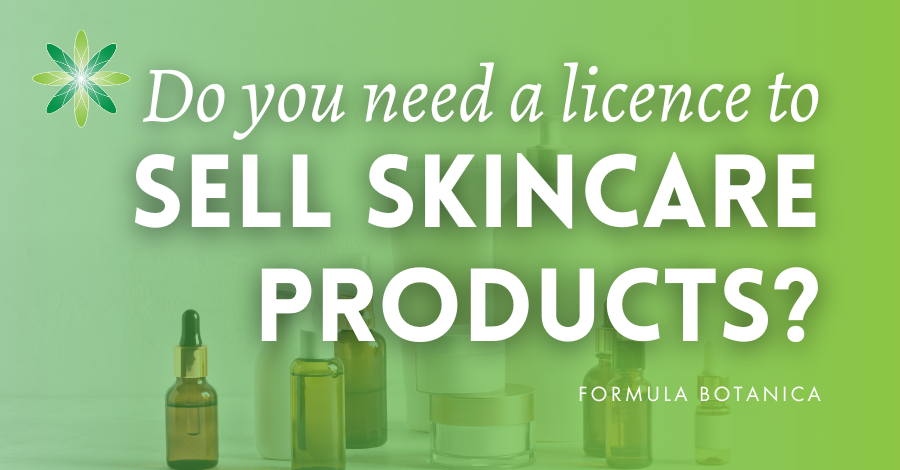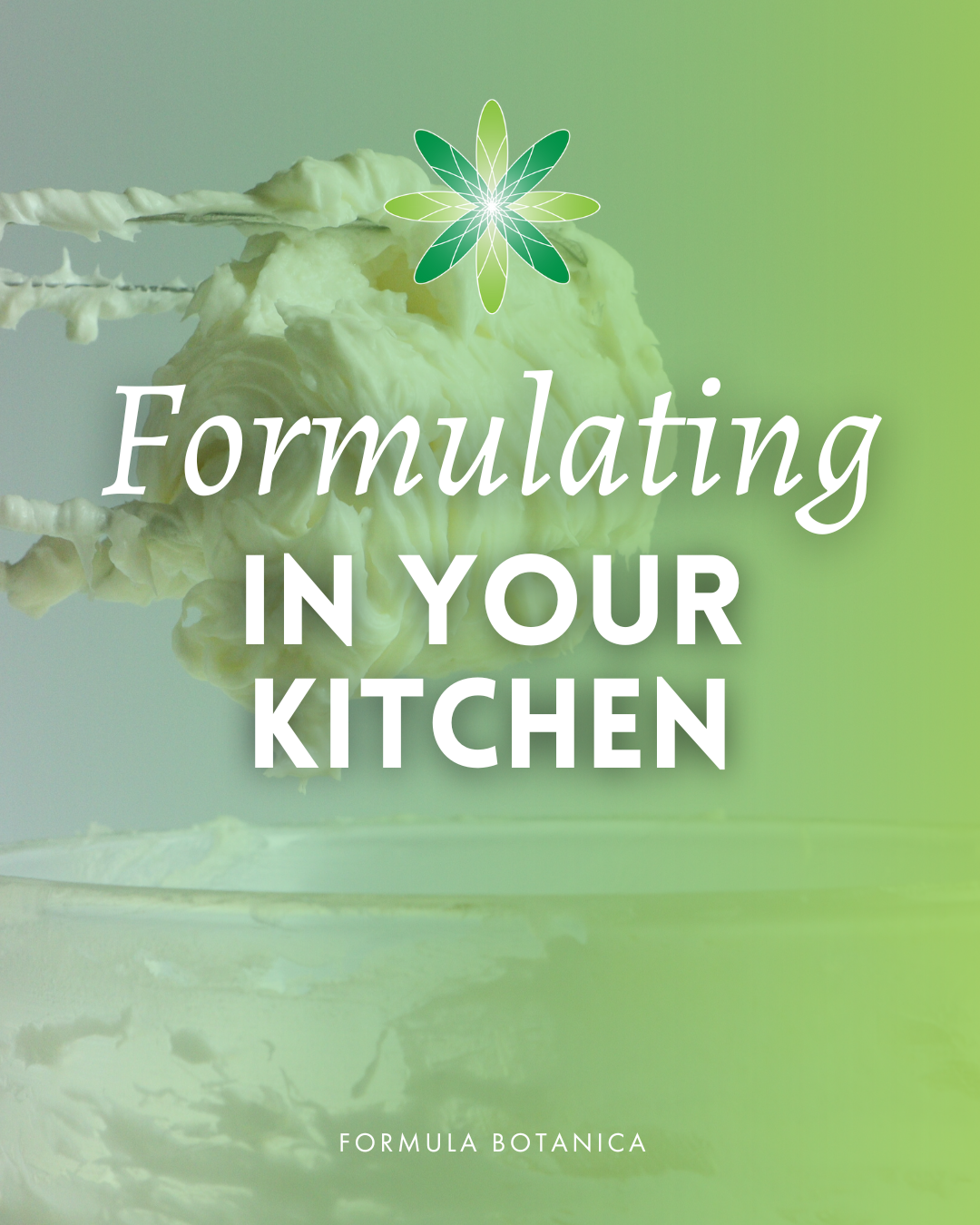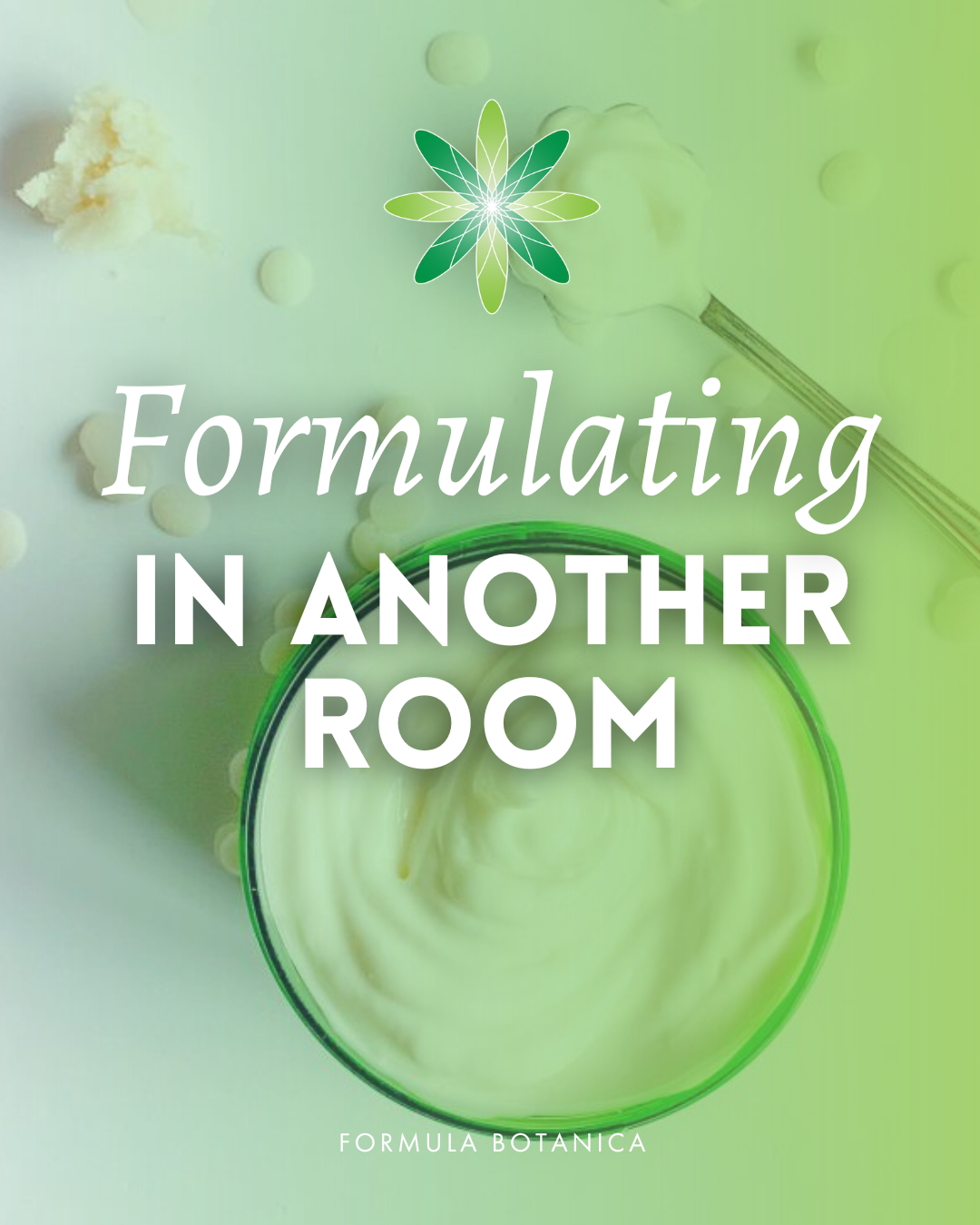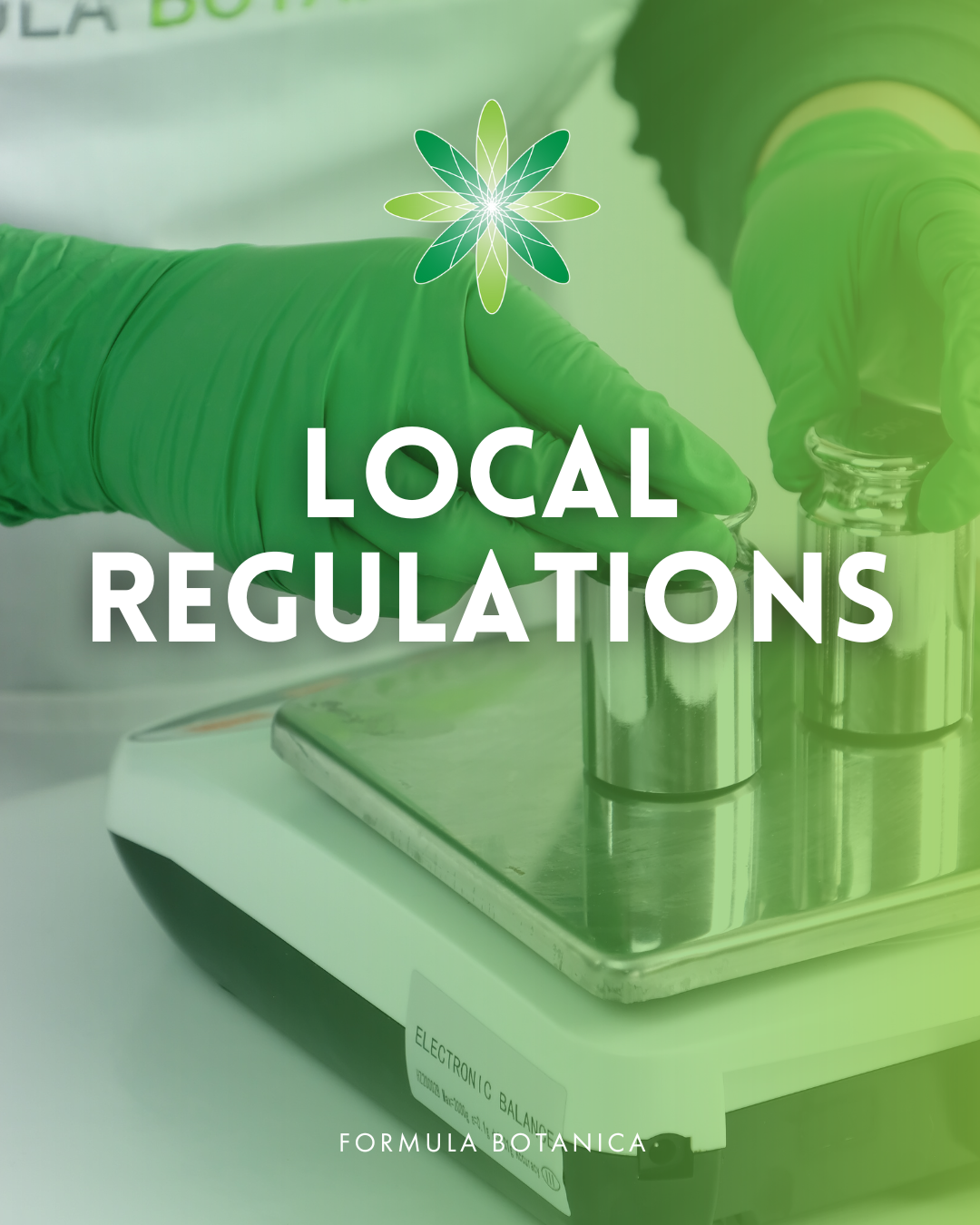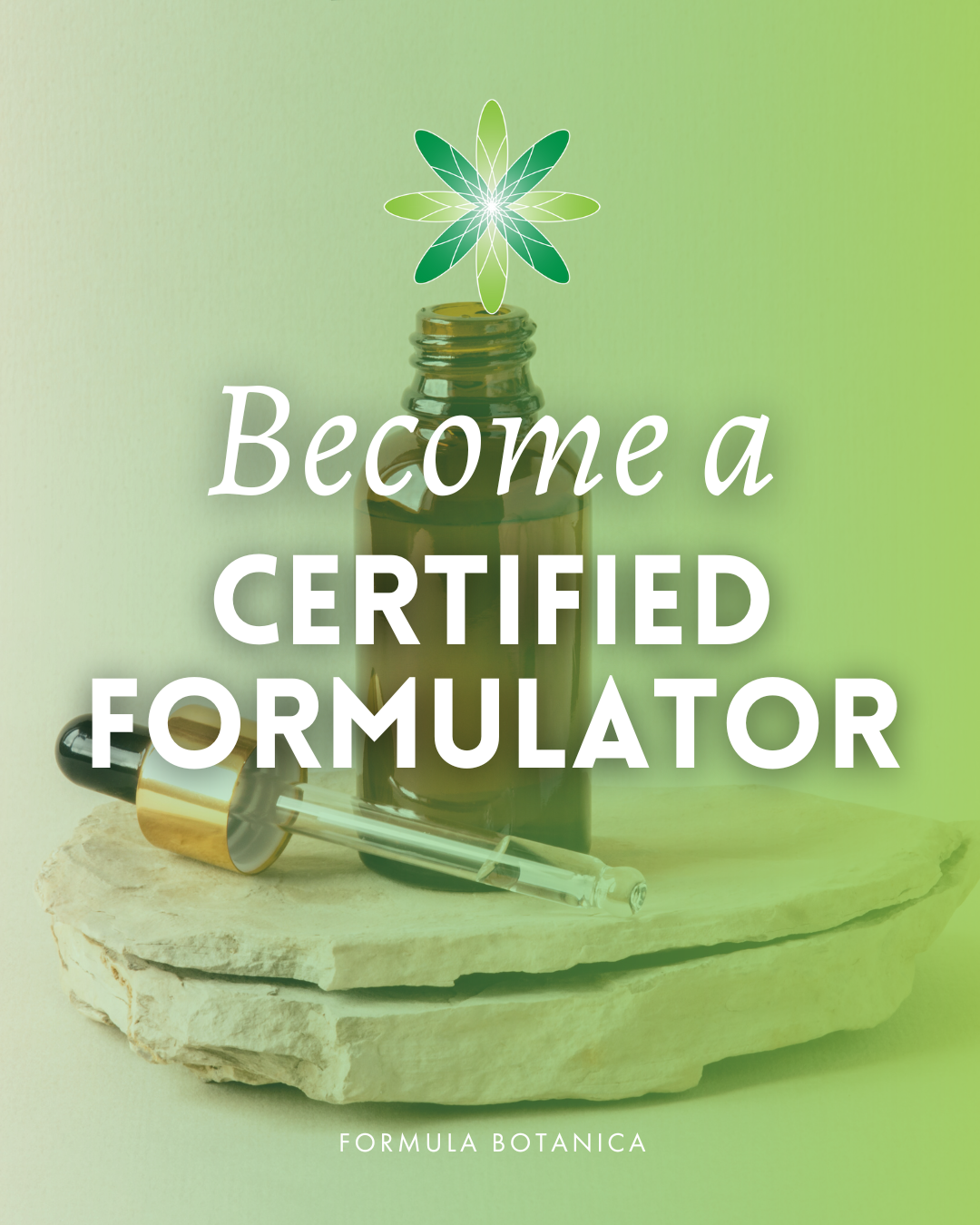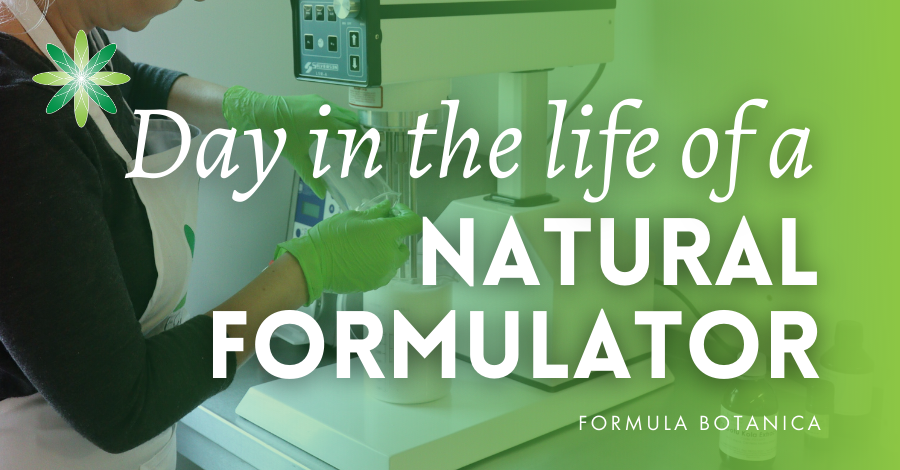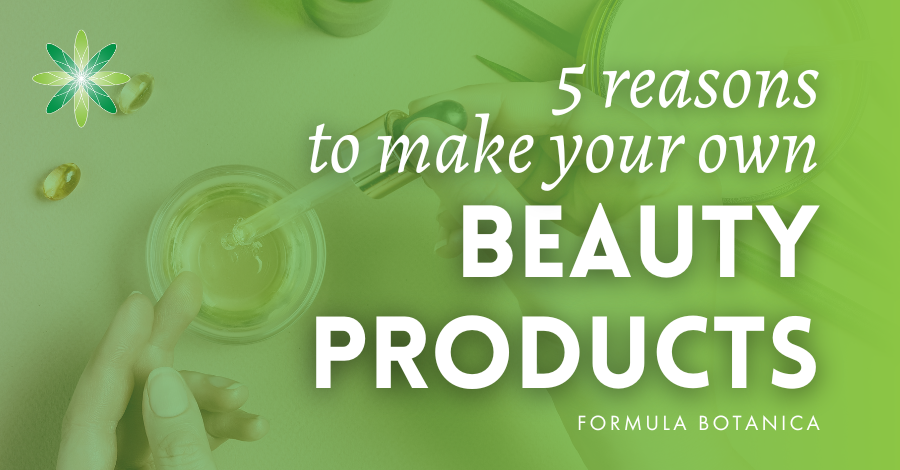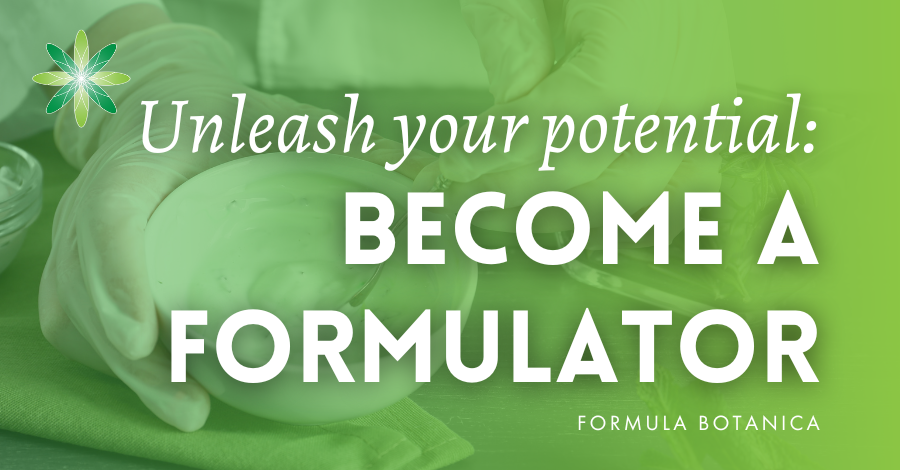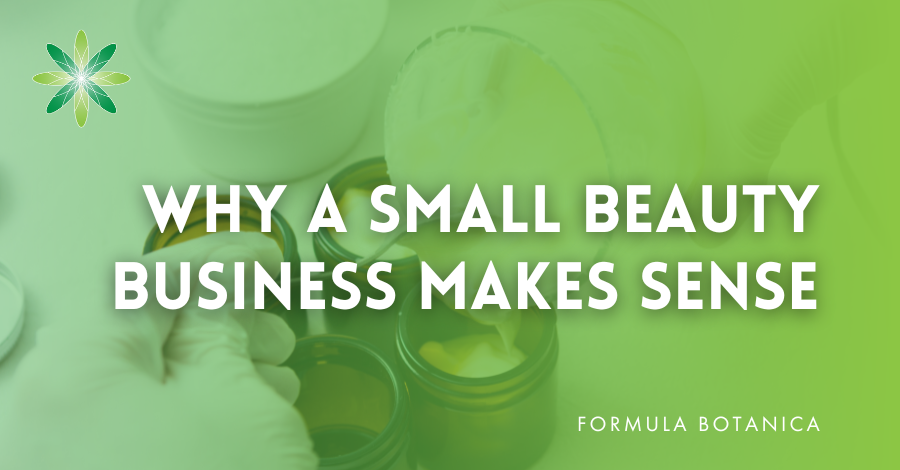Updated: 17.06.25
One of the most common questions we receive from prospective students at Formula Botanica is: “Do you need a licence to sell skincare?” This is a very valid question, especially for those who want to know if they can start a beauty business from home.
You’ll be happy to know that most of our students and graduates are artisan cosmetic formulators who manufacture in small batch sizes from home and sell to local customers.
But is this allowed? Is it even legal? And do you need a licence to sell skincare or haircare? We break it all down for you in this article.
Can you formulate in your kitchen?
You can formulate in your kitchen, as long as the cosmetics you make are safe. However, this brings risks.
After all, you don’t want to mix food and cosmetic ingredients (even if many of your natural ingredients, particularly oils, butters and hydrosols, are the same as those in your food). You also don’t want to expose your skincare or haircare formulations to contamination from your family or pets.
As a formulator, it’s your responsibility to manufacture products in an environment that will not cause them to become contaminated or adulterated. For that reason, we embrace cosmetic Good Manufacturing Practice (GMP) in our artisan labs.
Most countries around the world allow artisan formulators to work and manufacture from home, as long as their manufacturing facilities meet these GMP requirements, which we teach you about in our Diploma in Organic Skincare Formulation.
Bear in mind that it will generally be challenging to achieve GMP standards in a kitchen that is heavily used by a family for food preparation. You would need to completely clean down and sanitise your kitchen and all of your equipment in it before and after formulating, every single time.
Can you formulate in other parts of your home?
There are plenty of other spaces that formulators can use in their homes, instead of their kitchen. You could use one room in your home (away from your kitchen) which functions solely as your cosmetics lab. You could also use a bespoke shed in the garden.
We’ve seen plenty of our graduates build their own lab next to their home. You might even rent a room somewhere else, just for manufacturing purposes. One of our graduates, Rafaela, even set up a mobile 99 square foot workshop called the ‘Wilderness Lab’! Listen to her story now:
Once you know what type of cosmetic formulations you want to create, you can also invest in separate equipment that is only used for your business.
Designing your cosmetics lab is not as difficult as it might initially sound, as long as you comply with GMP and have properly defined areas that you’ll use for people, products and raw materials such as ingredients or packaging.
Want to learn how to comply with GMP standards and set up a professional manufacturing lab? Pre-register now for our Diploma in Beauty Brand Business Management!
Which countries don’t allow homemade cosmetics?
The great news is that most countries around the world allow artisan formulators to create cosmetics at home, as long as they comply with GMP. You will, however, need to comply with the regulations of your country, regardless of where you live.
Please remember to always check your local laws and guidelines to ensure your formulations and business practices are fully compliant.
To our current knowledge, countries which apply additional conditions for artisan formulators include:
- India: Under the Drugs & Cosmetics Act (1940) and Cosmetic Rules (2020), you need to obtain a COS‑8 manufacturing licence from your State Licensing Authority, and print that licence number on every label. You can’t manufacture cosmetics at home; production must occur in a licensed facility with qualified technical staff.
- Spain: Under EU Regulation 1223/2009 (as transposed by Royal Decree 85/2018), you must appoint a “responsible person” with appropriate training or proven experience in cosmetic safety and GMP. All manufacturing must happen in a licensed external laboratory; home‑based production is prohibited.
- Lithuania: As an EU member state enforcing Regulation 1223/2009, every cosmetic must be notified via the CPNP, produced under GMP in an approved external lab, and overseen by a designated responsible person. Home‑based manufacturing is not permitted.
- Indonesia: Under BPOM (NADFC) rules, you need a valid CPKB (GMP)-certified facility or a contract manufacturer and must secure a production licence before making any cosmetics. All products must be registered through BPOM’s online Cosmetics Notification Service and labelled in Bahasa Indonesia with ingredients, usage instructions, manufacturer details, and your BPOM notification number.
- Brazil: Per ANVISA’s RDC 07/2015 and RDC 497/2021, you must manufacture in a GMP‑compliant, ANVISA‑certified facility. Products are assigned risk classes I–IV, each triggering specific notification or registration steps. Home‑based manufacturing is not permitted.
- Florida, USA: Under Fla. Stat. § 499.01(2)(p) and DBPR regulations, anyone manufacturing or repackaging cosmetics in Florida needs a Cosmetic Manufacturer Permit. Simply labelling or re-labelling a sealed container is exempt. Small producers with annual gross sales ≤ $25,000 may be exempt, provided they label products “Made by a manufacturer exempt under § 499.01(2)(p).”
These resources might also help you:
How to comply with cosmetics regulations
Important 2019 changes to EU free-from claims
Have you missed your country off the list? Leave us a comment underneath this blog post and tell us what the laws specify in your country!
Note: While many countries don’t require you to have a licence to make or sell skincare, you still need to follow important regulatory steps like safety assessments, product notification, and labelling compliance. For example, to manufacture and sell cosmetics in the UK and EU, your product must have a Cosmetic Product Safety Report (CPSR) and be uploaded to the appropriate portal. Always remember to check your local laws and regulations.
IMPORTANT! – READ THIS
If you come up against regulatory issues around manufacturing cosmetics at home, don’t despair! There is a big difference between formulating at home and manufacturing at home.
After all, you can always design your formulations at home in your workspace and then outsource their manufacture to a factory. There are hundreds of cosmetics manufacturers worldwide who can take on your project. Here’s how you can do this:
If you want to launch a beauty brand, you will need to do a lot more than ‘just’ formulating anyway, so we encourage you to turn this into a positive and not feel disheartened!
Remember that outsourcing the manufacturing component of your beauty brand would free up your time to get your business operating smoothly.
Recap: Do you need a licence to sell skincare or haircare products?
To recap, the short answer is that you generally don’t need a licence to sell cosmetic products, but it depends on where you live.
It’s possible to make natural and organic skincare in most places. You just have to make sure that your workspace is safe for you, safe for your products and that it allows you to make safe skincare so you don’t endanger your customer or yourself.
You generally don’t need a licence to make and sell skincare from your home in the UK, the U.S. (except Florida), most countries in the EU, Canada, Australia and many other countries. Just remember to always double-check with your local regulatory bodies, as licensing requirements can vary on a region-by-region or state-by-state basis (as you can see from the example of Florida, USA).
You may also need a licence to run your business, but that requirement will then apply to every business owner in your country and is separate from the question of whether you need a licence to sell skincare or haircare.
Become a certified cosmetic formulator
We hope this blog post has answered your question about whether you need a licence to sell skincare or haircare! Unfortunately, we cannot cover every single territory, state and region globally, but we encourage you to leave us a comment below and tell us what the rules are like in your part of the world!
Want to learn more about creating a safe workspace for making natural cosmetics? Sign up for our free online course on how to become an organic skincare formulator, where one of the free lessons covers the steps required to prepare your workspace.
FAQ
- Do I need a licence to make or sell skincare or haircare?
Generally, no, but it depends on where you live in the world. Some regulatory authorities may permit you to formulate at home, but may want you to outsource manufacturing. You may also need a general business licence to operate and to register your products, but that’s separate from manufacturing skincare or haircare.
- Are there other regulations I need to follow besides having a manufacturing licence?
Yes. There are other cosmetic regulations you must adhere to when selling your products, and these are different from a manufacturing licence. Always check your local laws to ensure you’re fully compliant and complete all required steps.
- Can I still start a skincare or haircare business, even if I can’t manufacture at home?
Yes, you can! Just because you can’t manufacture at home doesn’t mean you can’t formulate at home. Hundreds of cosmetic manufacturing labs around the world can take care of that part for you.
- Can I formulate skincare or haircare in my kitchen?
Yes, as long as you comply with cosmetic Good Manufacturing Practice (GMP). Meeting GMP in a heavily used and busy kitchen may be a struggle, so we recommend allocating a separate room in your home if you can.
- Which other rooms in my home could I use to formulate skincare or haircare?
It depends on your individual set-up. Some Formula Botanica students use a spare room, while others allocate part of an office space to their lab, or build a small bespoke formulation lab in their kitchen. We have even seen some of our students rent a whole separate room for manufacturing.
- Where can I learn to make natural skincare and haircare?
Formula Botanica is the only education and training you will ever need to become a professional organic/natural formulator. Check out our award-winning online courses now.
FREE TRAINING
Learn how to become an
Organic Skincare Formulator
FREE TRAINING
How to become an
Organic Skincare Entrepreneur
FREE TRAINING
How to become an
Organic Skincare Entrepreneur
Leave us a comment
Lorraine Dallmeier is a Biologist, Chartered Environmentalist and the CEO of Formula Botanica, the award-winning online organic cosmetic science school. Read more about Lorraine and the Formula Botanica Team.

